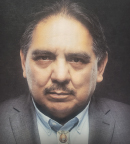As a Native American and former president of the Seneca Nation of Indians, I am keenly aware of the disparities in cancer care we face in accessing screening and treatment, which results in worse survival rates compared with those of racial and ethnic populations.1 Native American and Alaska Native men are also more often diagnosed with advanced prostate cancer and die of the disease,2 a statistic that became all too personal to me when a close friend died of the cancer. So, when my own prostate-specific antigen (PSA) levels started to rise in 2022, I made it a point to get regular prostate cancer screenings, and the following year, I was diagnosed with early-stage prostate cancer.
Although I knew with my PSA levels rising over the preceding year that this would be the likely outcome, I worried about how the diagnosis and treatment would impact my life and, even more concerning, the effect they would have on my family. My wife had been diagnosed with breast cancer during the COVID-19 pandemic, and the memory of that experience was still fresh in our minds. Fortunately, she had received treatment at Roswell Park Comprehensive Cancer Center in Buffalo, New York, which serves members of our tribe and provides community-based health services and educational programs to the Cattaraugus Territory of the Seneca Nation of Indians. She is now cancer-free, and that was my goal, too, as I sought care at the same cancer center.
Facing a Setback
After discussing treatment options with my oncology team, including surgery, radiation, and chemotherapy, I decided to have a prostatectomy. I knew there were risks with this surgery, such as urinary incontinence and erectile dysfunction, both of which I experienced, but I just wanted the best chance to be rid of this cancer.

“My personal experience with cancer has driven me to become an even stronger health advocate for members of my tribe.”— TODD GATES
Tweet this quote
My recovery from the surgery has been slow, and despite the aggressive treatment, I recently learned the cancer has recurred and spread to other parts of my body. I am now receiving a combination of the androgen biosynthesis inhibitor abiraterone and prednisone and will soon start a course of radiation therapy. Although this is not the outcome I was hoping for, I remain optimistic that although it may not be possible to cure the cancer, continuing advances in the treatment of metastatic prostate cancer will turn it into a chronic disease, which enables me to live a high-quality life for many years.
Advocating for Quality Health Care
My personal experience with cancer—and the escalating incidence of cancer and cancer-related deaths among Native Americans—has driven me to become an even stronger health advocate for members of my tribe. As a former tribal president, former tribal treasurer, and current tribal council member, I’m fully aware of the health and financial challenges we face and the barriers to accessing high-quality health care, even with health insurance.
I’m fortunate. In addition to the health insurance I receive from the Indian Health Service, I also have private insurance through my employer, so most of my cancer care was covered. However, I still had to fight to get coverage for a necessary magnetic resonance imaging scan before my surgery, which delayed the date of the operation and added to my level of anxiety. Patients going through cancer or any serious illness shouldn’t also have to expend precious energy and time battling the health-care system for needed care.
Screening was key to the early detection of my prostate cancer, and I feel an obligation to help educate my community on the importance of early cancer detection and treatment. I work to build relationships with educational and medical institutions and health-care organizations to improve access to health services and reduce disparities in care and deaths from cancer.
Screening and advances in research and more effective treatment have led to prostate cancer becoming a more treatable, less deadly disease. When I was diagnosed, my oncologist told me “I might die with prostate cancer, but I wouldn’t die because of it.” His words were encouraging then and remain encouraging now, as I face this next chapter in my cancer journey. Through my advocacy for quality health care, I try to send a similar supportive message throughout my community: Get screened, get treated early, don’t die of cancer.
REFERENCES
1. Guadagnolo BA, Cina K, Helbig P, et al: Assessing cancer stage and screening disparities among Native American cancer patients. Public Health Rep 124:79-89, 2009.
2. Chu CE, Leapman MS, Zhao S, et al: Prostate cancer disparities among America Indians and Alaskan Natives in the United States. J Natl Cancer Inst 115:413-420, 2023.
Mr. Gates, 62, lives in the Cattaraugus Territory of the Seneca Nation in Irving, New York.
Editor’s Note: Columns in the Patient’s Corner are based solely on information The ASCO Post received from patients and should be considered anecdotal.

